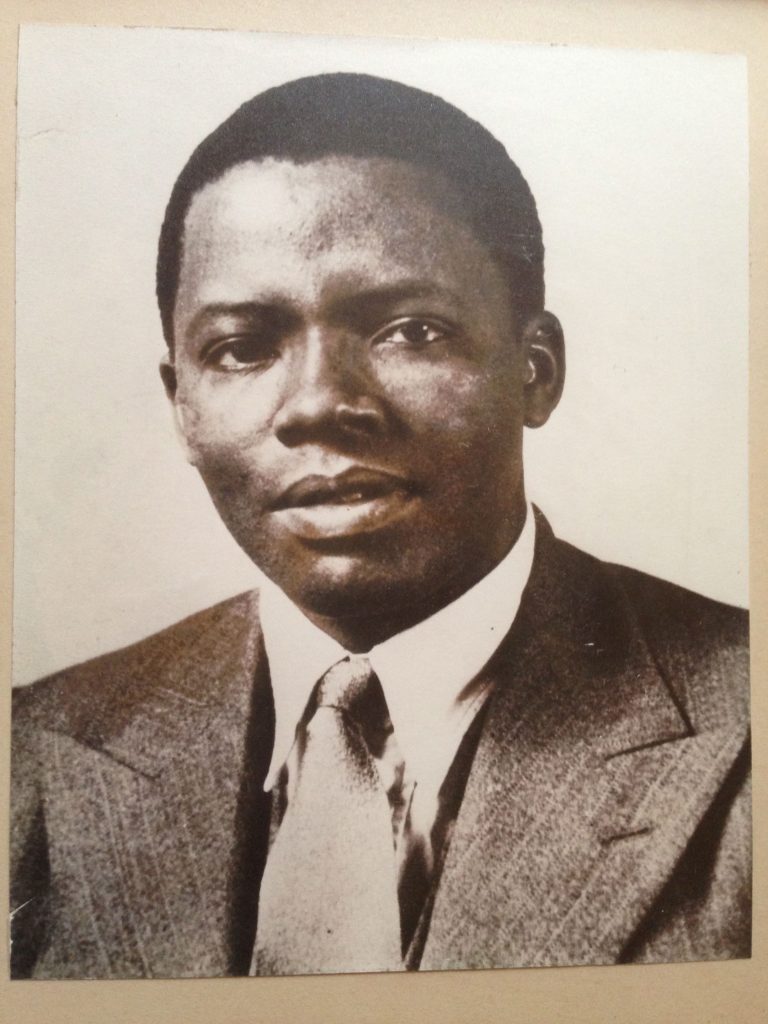
Michael Mosoeu Moerane
Michael Mosoeu Moerane was born on 20 September 1904 in Mangoloaneng, a village in the Matatiele/Mount Fletcher district of the Eastern Cape, located in the larger region known as East Griqualand, or Transkei. He was one of seven children born to Eleazar Jacane and Sophia Moerane. His father was descended from a long line of Basotho chiefs, and was an emissary for the Basotho royal family and an evangelist for the Paris Evangelical Missionary Society.
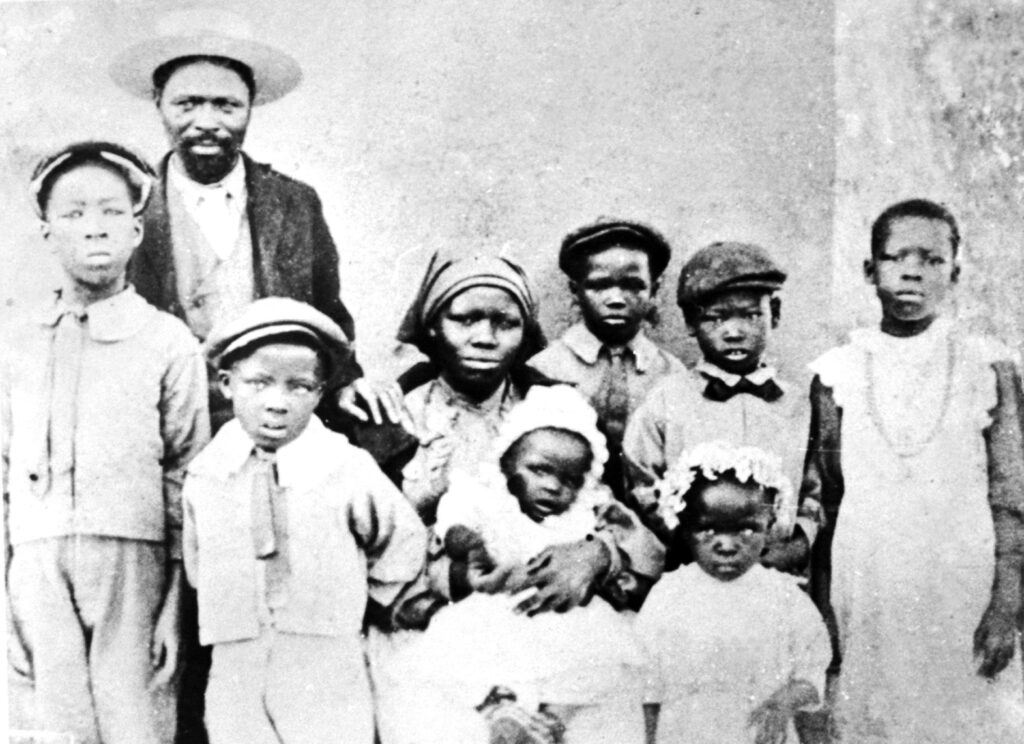
Moerane attended his father’s junior primary mission school and then the nearby Mariazell Catholic mission school, before going to Morija Training Institution in Lesotho in 1920/21 to complete middle schooling and to obtain a primary school teaching certificate. He taught at St John’s College, Mthatha in 1922 and enrolled at Lovedale High School, Alice, in 1923, completing the school level then called Standard VIII, in 1924. In 1925, he entered the South African Native College (SANC, later called Fort Hare University) in Alice (also in the Eastern Cape) to complete the final two years of school, Standards IX and X. The SANC was at that time the only place in southern Africa where Africans could obtain a Senior Certificate or a University Matriculation Certificate, their passport to a professional job or further education. Future African leaders in many fields studied there, including Nelson Mandela. Moerane obtained a Matriculation Certificate in 1926, while simultaneously teaching at Lovedale High School and Lovedale Training School, and while also completing a high school teaching diploma at the Training School. He continued teaching at the two Lovedale institutions, and by 1929 he was on the staff of the Lovedale Practising Schools as well.
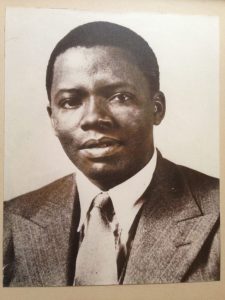
By 1931, Moerane had obtained a permanent post at Lovedale High School, which he held for the next eight years. The same year, he married Beatrice Betty Msweli, who had been a fellow student at Lovedale. Their first child, Mofelehetsi, was born in Alice at the end of 1931, followed by a daughter, Mathabo. A second son, Thuso, was born in 1935 in Kroonstad, where Moerane’s wife was by that time teaching. Three more children were born: two daughters (Hadieo and Sophie) and a son (Thabo). who was born in 1947. In 1931, as well, Moerane registered for a B. Mus degree, part-time, through Rhodes University College, a satellite campus of the University of South Africa, which was at that time the only university offering distance learning and therefore accessible to a black student. He completed the B.Mus. degree through correspondence in 1941.
With his growing family, Moerane moved to Basutoland (now Lesotho) in 1938, where he took up a post at the newly opened Basutoland High School, in Maseru (now called Lesotho High School). He taught Sesotho and Commercial Arithmetic, among other things. Music teaching and performing was then, and remained throughout his career, an extra-mural activity. The Moeranes left Basutoland at the end of 1939 and moved back to Alice, South Africa. For the purpose of completing his final courses and studying with Rhodes Music Professor, Friedrich Hartmann , Moerane commuted between Alice and Grahamstown for much of the year. In 1942, he obtained a position at the Queenstown Secondary School (now called the Bantu Secondary School). The family lived in Victoria Road, Queenstown, and then moved to 10 Scanlen Street. Michael and Betty had two more girls, Halieo and Sophia, and their last son, Thabo, was born in Queenstown in 1947.
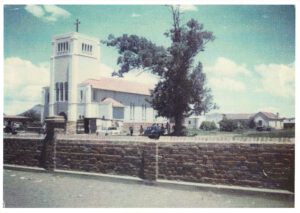
Moerane had begun composing short a cappella choral works in tonic solfa notation some time during the late 1920s or early 1930s, and two of these were published by Lovedale Press in 1938: Liphala and Nobody Knows the Trouble I’ve Seen. The latter is an arrangement of the American spiritual. In 1936, he wrote a set of piano pieces called Album for the Young (the same name as the set of piano pieces that Schumann had composed in 1848). For his final B.Mus. exam in composition in 1941, Moerane wrote a 10-minute orchestral symphonic poem called Fatše la Heso (My Country). The country referred to here is Basutoland/Lesotho, not South Africa, and the work is based on Sotho themes. Moerane continued writing choral pieces during the 1940s and 50s, but he rarely dated them and so it is difficult to pinpoint exactly when and where he wrote them. Only approximately 10-15 pieces were known during his lifetime, among them Ruri, Sylvia, Della, Morena Tlake, Matlala. In 2014, another 35 were discovered, including seven more arrangements of spirituals. There are still at least 20 missing works, including choral works and several short pieces for for his school ensemble, the ‘African Springtime Orchestra’.
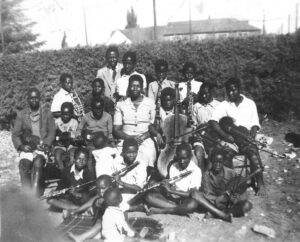
Perhaps as a result of successful performances of Fatše la Heso in London (1944), Manchester (1945), and New York (1950), someone donated a small consignment of orchestral instruments to Moerane which were shipped to his home in Queenstown. Here the first ‘African Springtime Orchestra’ was formed, mainly from family members, who played strings, flute, clarinet, trumpet, and trombone. One of the members was the young Thabo Mbeki, who lived with his uncle and aunt in Queenstown in 1952. Moerane remained at Queenstown until 1957, taking part as a member of the Cape African Teachers Association in protests against the National Party’s introduction of ‘Bantu Education’. This eventually caused him to be given enforced ‘early retirement’ from the ‘Bantu’ Secondary School. His nephew, Mbeki, remembers that Moerane was also a supporter of the Non-European Unity Movement, NEUM. Moerane went to Mpondoland in 1957-59 to teach at Mfundisweni College of Education, where his daughter Sophia was a student. He returned briefly to Queenstown some time in 1960, and in 1961 he returned to Basutoland to teach English Language & Literature, Latin and History, at Peka High School in northern Lesotho. Here he formed a new configuration of the ‘African Springtime Orchestra’, which included his students at the school (one of them was Zakes Mda) and his son Thabo. Moerane was sympathetic to the Basutoland Congress Party, which opposed Chief Leabua Jonathan’s Basutoland National Party. Jonathan lost the 1970 election but seized power and ran a brutal regime until he was removed in a coup in 1986, six years after Moerane’s death.
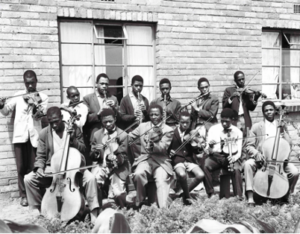
Michael Mosoeu and his wife seem by the late 1960s to have gone their separate ways, and ‘Auntie Betty’ as she is known in the family returned to live with their son Thuso, in Queenstown, until her death in April 1980. Thuso was a political activist who had shouldered the forced removal of his family from Scanlen Street in the 1960s, and was served with a banning order in 1966. The Moerane house was destroyed under the Group Areas Act when the street was rezoned for Indians, and Thuso’s family moved across town and eventually settled in ‘White City’, Mlungisi location. Surprisingly, the houses next door – no. 8 Scanlen St, where Todd Matshikiza lived, and no. 6, where Lex Mona lived – were not destroyed. Moerane and Matshikiza did not always get along, although Moerane taught a number of Queenstown’s jazz musicians. He disapproved of the immorality and liquor often associated with jazz, and tried to stop his children from being unduly influenced by their neighbours. His eldest son, Mofelehetsi, nevertheless joined Lex Mona’s group as a vocalist, and was subsequently banished to Ohlange Institute, Durban to continue his education.
Moerane taught at Peka High School In Lesotho until his retirement, after which he helped to establish the new music department at Lesotho Teachers Training College in Maseru. He lived in the village of Tsifalimali, and also had houses in Maseru and Peka village. His son, Thabo, who in the 1970s was working for the United Nations in Geneva, used to visit him in Tsifalimali during his vacations in Lesotho, and retired to Tsifalimali. Adjoining this house was a shop that supplied the villagers with basic needs, and it was a constant feature of Moerane’s life that he was always concerned with the well-being of his community. Moerane fell ill some time in late 1979 or early 1980 and was eventually transferred to Pelonomi Hospital, Bloemfontein, where he died on 27 January 1980. He is buried in the graveyard outside Tsifalimali. Thabo was the most musically talented of all Moerane’s children, and very close to his father. When he died in 2006 he was buried close to his father, in Tsifalimali.
It is not known whether or not Moerane received any honours or awards during his lifetime, except for the May Esther Bedford Award for Album for the Young in 1937, but he has been increasingly regarded as a key figure in South African composition, since his death. Michael Mosoeu Moerane was a member of the Southern African Music Rights Organisation (SAMRO), which protects the copyright invested in his music on behalf of his heirs. All the extant music by Moerane, which mostly existed only in manuscript or typescript until now, is now published on this website as the ‘M.M. Moerane Scholarly Edition’. Research for this Edition has been funded by the Andrew Mellon Foundation, through the Africa Open Institute for Music Research, Stellenbosch University.